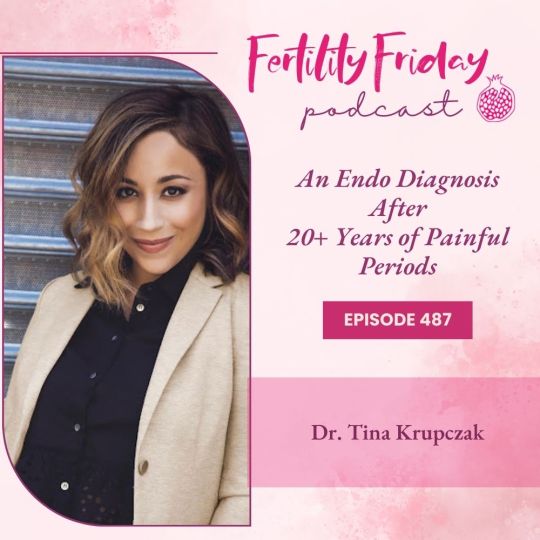#fertility awareness
Text
But then mom showed me a booklet of the information her daughter had learned in public school. She went on to tell me that the information in this booklet was presented in a co-ed classroom. Boys and girls were not separated in order to facilitate comfortable discussion, which led to some troubling conversations at home. She told me that another mom-friend had a son, who after the presentation asked her:
"Mom, am I going to get a period?"
"What?! No. Why? Why would you think you're going to get a period?"
"Because in the presentation, they said that people with uteruses get periods. And I don't know if I have a uterus or not. They didn't tell me."
-Christina Valenzuela, Pearl & Thistle’s July 2023 newsletter
41 notes
·
View notes
Text
Lessons to learn from this couple’s story:
1. learn how to track your cycle before pursuing any fertility treatments or assisted reproductive technology (couple wasted thousands on IUI not knowing the wife wasn’t in her fertile window when they did it - makes me wonder what else could have been done prior to IUI if she’d been tracking)
Click here to find a Fertility Care Center that teaches the Creighton Model (preferred fertility awareness method for trying to conceive and diagnosing reproductive health issues)
2. find a physician who uses NaProTechnology for the best opportunity to actually treat fertility issues without turning to assisted reproductive technology.
3. If all these fail and you are told you are a candidate for IVF, look into adopting an existing embryo rather than creating new embryos. Alternatively, look into adopting from foster care.
4. If you insist on giving birth to your biological child, take time to reflect and examine why you “must” have a child that is biologically “yours.” Are you doing what is in the best interest of your future child by creating an embryo outside the womb and risking the life of that child during the implantation process?
5. If you absolutely insist still on pursuing IVF, find a doctor who shares the view that these embryos are human children - one who won’t create FORTY-EIGHT embryos. This will be much more expensive than regular IVF, as it may require more cycles of harvesting and fertilizing eggs. Again, go back to number 4. Pray, talk to your pastor, consider the risks and ramifications of this path versus the joy that could be had with the adoption of a child through foster care or embryo adoption.
Life begins at fertilization. We need to start acting like it and stop creating children who will sit in freezers for decades, their chances of successfully implanting decreasing with each passing year.
65 notes
·
View notes
Note
hi!! i’ve seen your blog for years, and you seem to be one of the more popular pro-life blogs around. i was wondering if you have any posts about your views on accessibility to contraception/sex ed and how those relate to abortion.
Hello, friend!
My personal views on contraception may differ from others in the pro-life movement. I can say the Pro-Life movement does not advocate prohibiting the use of non-abortive contraceptives. When it comes to birth controls, you have to be careful with ones that are abortifacients. Students for life explains which contraceptives are abortifacients and which aren't:
I agree with SFLA when they say, "Contraception can give women a false sense of security, and condoms and birth control clearly can’t be relied on as fail-proof methods of stopping a pregnancy from occurring." If you read their website I linked above, they have a section on birth control and how it relates to abortion. I also found this scientific article that discusses the possible relationship between abortion and contraception. The author includes other studies that show trends with increased use of contraception in a population and an increase of abortions. Of course this doesn't necessarily mean the two are related.
If you want to see any posts from others in the pro-life movement on contraception, I have it tagged here. I personally believe fertility awareness is very important and there would be less unexpected pregnancies if women were more aware of what their cycle means. I have met so many women in their late 20s who were never taught about what your cervical mucus (vaginal discharge) means, how to tell when you're fertile, or how to track your period. Being able to consistently track your cycle really helps you understand your body and if there's something wrong with your reproductive health.
Our public school sex education fails to teach young women about their cycle and how to track fertility and I think that has lead to a lot of unintended pregnancies, which leads to more abortions. If women could recognize that "hey, my discharge is really stretchy and clear, I am probably ovulating and fertile right now. I have an increased risk of becoming pregnant if I have sex. I should wait." Or "I am very dry today, which means I'm not fertile. I have a very low risk of pregnancy if I have sex," there would be less unintended pregnancies. I think the public school system's sex ed has failed everyone and sets teens up for failure by saying "don't have sex, but if you do, here's a condom." That's basically telling kids, "we expect you to fail." Sex ed should be teaching kids about what to expect in puberty, help them understand their hormones, and teach them about women's cycles. Parents should really be the ones teaching their kids this stuff, especially about sex and contraception, and how to handle their sexual urges and feelings. I don't think schools should be discussing sex with minors.
For posts on birth control, I have it tagged here.
If you ever want to talk to someone about birth control and accessibility to it, @she-is-a-prolife-autist is very pro accessible birth control.
I hope I was able to answer your ask. Let me know if you have any further questions.
-Sarah
#prolife#pro-life#pro life#anti abortion#contraception#birth control#ask#asks#thanks for the ask#bc#fertility awareness
17 notes
·
View notes
Text
"For the first time, an oral contraceptive is going to be available over the counter, without a prescription. On July 13, the Food and Drug Administration (FDA) announced that it has approved the contraceptive pill Opill. Many are praising the FDA’s decision as a significant step toward making contraception more widely available. Perrigo Company, the pill's Dublin-based manufacturer, stated that Opill will most likely be available in grocery and convenience stores, as well as online, in early 2024. Perrigo’s president and CEO Murray Kessler called the FDA’s decision “a new, groundbreaking chapter in reproductive health.”
"It may indeed be groundbreaking—but not for the reason Kessler believes. Contrary to popular myth, increased use of contraception is correlated to an increase in abortions. And despite what proponents claim, hormonal birth control has a damaging effect on both mental and physical health...Opill, like other forms of hormonal birth control, primarily consists of progestin, “a hormone that thickens mucus in the cervix to make it harder for sperm to enter the uterus,” according to the New York Times. Opill is said to be less effective than pills with both progestin and estrogen, yet defenders of the FDA’s decision say that Opill is still highly effective as long as it is taken at the same time every day."
The article makes the point, which everyone who studies this knows, that the pill actually increases nonmarital pregnancies, because the pill requires regular use, and the kind of people who are not disciplined enough to wait until marriage are often also not disciplined enough to take a pill every day. This version of the pill seems to require an extraordinary high level of discipline--it must be taken at the same time every day. "Unintended" pregnancies in the U.S. basically never occur because contraceptives aren't available, but because the couple does not use them properly.
The article also makes the point about the extensively documented link between the pill and depression, which I've blogged about before. It might have mentioned the link between the pill and blood clotting, which might be dangerous if the pill is taken over the counter and the user is not in touch with a doctor.
The article does not make a point that it easily could have, that this is a huge win for Big Pharma. Notice that it is the CEO who calls this "groundbreaking." I'm assuming the Biden administration will get its fair share of donations this cycle.
The article also does not discuss something that I think is relevant. Typical birth control pills are on the list of known carcinogens by the International Agency for Research for Canger (IARC), a project of the World Health Organization. They are in category 1, the same as tobacco. It's likely that the explosion in cases of breast cancer over the last 50 years is caused by increasingly widespread use of the hormones in the pill. The CDC says that using the pill increases a woman's chances of breast and cervical cancers by as much as 60%. As I wrote a few years ago, "It’s safer to smoke 5-8 cigars daily (relative risk of cancer 1.17; see Table 3)–which almost nobody does–than to be on the Pill (relative risk 1.24 for current users)."
(The article does not say more about whether the reduced amount of estrogen is intended to make Opill less carcinogenic, but I can't imagine that we have sufficient data on this particular pill to determine this.)
The argument for having restrictions on tobacco sales is that tobacco causes cancer. The same argument should argue for at least the same restrictions on Opill. Defenders of the pill will point to studies that show the likelihood of cancer drops off once someone stops using the pill (as in the CDC link above); the likelihood of cancer also drops off once someone quits smoking cigarettes. Given these parallels, I would think that states would want to pass laws restricting over the counter sales of either carcinogen to minors.
The more people become aware that playing with the hormones in the body is not that safe, the more people will switch to using fertility awareness methods, which are natural and more in tune with the environment. But these natural methods don't make Big Pharma any money!
4 notes
·
View notes
Text
What is IVF?
In recent decades, advancements in medical science have revolutionized the field of reproductive medicine, providing hope and opportunities for couples struggling with infertility. One such groundbreaking technique is In Vitro Fertilization (IVF). In this blog post, we will delve into the intricacies of IVF treatment, exploring what it is, how it works, and the potential it holds for those seeking to build a family.
What is IVF?
In Vitro Fertilization, commonly known as IVF, is a fertility treatment that involves the fertilization of an egg with sperm outside the human body. The process begins by extracting eggs from a woman's ovaries and fertilizing them with sperm in a laboratory dish. Once fertilization occurs, the resulting embryos are then implanted in the woman's uterus with the hope of establishing a successful pregnancy.
Understanding the IVF Process
Ovulation Induction: The first step in IVF involves stimulating the ovaries to produce multiple eggs. Fertility medications are administered to enhance egg production, monitored through ultrasound and blood tests.
Egg Retrieval: Once the eggs are mature, a minor surgical procedure known as egg retrieval is performed. A thin needle is inserted through the vaginal wall to collect the eggs from the ovaries.
Fertilization: The collected eggs are then combined with sperm in a controlled environment, allowing fertilization to occur. This step is closely monitored to ensure the formation of healthy embryos.
Embryo Culture: The fertilized eggs, now embryos, are cultured and monitored for several days. The healthcare team assesses their quality before selecting the most viable embryos for transfer.
Embryo Transfer: In the final step, one or more selected embryos are transferred into the woman's uterus. This is a relatively simple and painless procedure that aims to establish a successful pregnancy.
Success Rates and Considerations
IVF success rates vary depending on several factors, including the age of the woman, the cause of infertility, and the quality of the embryos. While some individuals achieve pregnancy in the first cycle, others may require multiple attempts. It's essential to approach IVF with realistic expectations and to consult with healthcare professionals to understand individual circumstances.
Challenges and Emotional Aspects
Embarking on an IVF journey can be emotionally challenging for couples. The process involves physical, emotional, and financial commitments, and individuals may experience a range of emotions, from hope and excitement to disappointment and stress. Support from loved ones and mental health professionals can play a crucial role in helping individuals navigate these challenges.
Conclusion
In Vitro Fertilization has emerged as a beacon of hope for many couples facing infertility challenges.
Schedule a Consultation with Dr. Sonal Lathi Today If you are considering IVF treatment, Dr. Sonal Lathi is the perfect choice for you. She is a leading expert in IVF, and she is committed to helping couples achieve their parenthood dreams.
#IVF#fertility treatment#reproductive health#in vitro fertilization#family building#infertility#assisted reproductive technology#egg retrieval#embryo transfer#pregnancy journey#parenting hope#medical advancements#healthcare#women's health#parenthood#emotional wellness#support network#family building options#fertility awareness#IVF success#embryo quality#hopeful beginnings#modern medicine#couples' journey#future of reproductive medicine#life through IVF
2 notes
·
View notes
Text
#infertility treatment#ivf specialist in bhubaneswar#fertility clinic in bhubaneswar#ivf center in odisha#female infertility#fertility center in odisha#fertility experts#fertility treatment#ivf treatment#ivf experts#pregnancy issues#pregnancy problem#ivf pregnancy#pregnancy tips#fertility awareness#Fertility clinic in Odisha#Best fertility Clinic in Bengaluru#Best IVF clinic In Bengaluru
2 notes
·
View notes
Text
books to encourage womanly bodily autonomy.
With all of the craziness going on right now in the world, now is the perfect time for us ladies to learn about how we have been lied to about our bodies for the longest time.
We’ve been robbed time and time again of honest healthcare and honesty around our reproductive rights. They depend on us to be dependent upon them.
These are a few books that have allowed me to regain my bodily autonomy as a woman successfully for years and years. I hope they are beneficial to you.
Taking Charge of Your Fertility
In The Flo
The Woman Code
The Fifth Vital Sign
Fuck the patriarchy. Women deserve so much better.

#roe wade#wellness#bodily autonomy#womens rights#fertility#fertility awareness#fertility awareness method
45 notes
·
View notes
Link
#link#fertility awareness#fertility#ovulation#menstruation#menstrual cycle#lisa hendrickson-jack#contraception
13 notes
·
View notes
Text
I absolutely hate when my coworkers discuss their period apps at work.
Because I actually have good advice. Those apps are pretty much all garbage guessing apps. They’re useless for tracking your period unless you’re a robot or on birth control and if you try to use it to avoid pregnancy guess what that’s just the rhythm method but with technology.
You actually can track your period and your fertility. But no one wants me to get on my little special interest soap box at 5:20pm in the break room so instead i have to bite my tongue in half so I don’t info dump all over the normies again.
1 note
·
View note
Text
The Importance of Family Planning Counseling in India

Introduction:
Family planning counseling plays a crucial role in empowering individuals and couples to make informed decisions about their reproductive health and family planning goals. In India, where cultural norms and societal expectations often influence reproductive choices, family planning counseling serves as a valuable resource for individuals to access information, support, and guidance. This blog post explores the significance of family planning counseling in India, its benefits, and how individuals can access these services to make informed choices about their reproductive futures.
Heading: Understanding Family Planning Counseling
Family planning counseling is a supportive and educational process that helps individuals and couples understand their reproductive options, contraceptive methods, fertility concerns, and pregnancy planning. It aims to empower individuals to make decisions that align with their personal values, health needs, and life circumstances.
Heading: Benefits of Family Planning Counseling
Informed Decision-Making: Counseling sessions provide individuals with accurate information about contraception, fertility, pregnancy, and childbirth, enabling them to make informed decisions about their reproductive health.
Personalized Guidance: Family planning counselors offer personalized guidance tailored to individuals' or couples' specific needs, preferences, and concerns.
Contraceptive Education: Counseling sessions cover various contraceptive methods, including their effectiveness, benefits, risks, and side effects, helping individuals choose the most suitable option for their lifestyle and health.
Fertility Awareness: Family planning counseling educates individuals about fertility awareness methods, menstrual cycle tracking, and ovulation prediction, empowering them to understand their fertility and plan or prevent pregnancy accordingly.
Preconception Counseling: For individuals or couples planning to conceive, preconception counseling provides valuable guidance on optimizing health, addressing pre-existing medical conditions, and preparing for a healthy pregnancy.
Heading: Finding Family Planning Counseling Services in India
Government Health Centers: Public health facilities, such as primary health centers and community health clinics, offer family planning counseling services free of charge or at a nominal fee.
Private Clinics: Private healthcare providers, including gynecologists, obstetricians, and reproductive health specialists, offer family planning counseling services in their clinics or hospitals.
Nonprofit Organizations: NGOs and nonprofit organizations focused on reproductive health and family planning may offer counseling services, often targeting underserved communities or marginalized populations.
Online Platforms: Some online healthcare platforms provide virtual family planning counseling services, offering convenience and accessibility for individuals seeking support from the privacy of their homes.
Referrals: Seek referrals from healthcare professionals, friends, or family members who have accessed family planning counseling services in the past and can recommend reputable counselors or clinics.
Conclusion:
Family planning counseling plays a vital role in promoting reproductive health, empowering individuals, and enabling informed decision-making about family planning and pregnancy. In India, where access to comprehensive reproductive healthcare may vary, family planning counseling serves as a valuable resource for individuals to access information, support, and guidance tailored to their needs. By seeking family planning counseling services, individuals and couples can make empowered choices that align with their reproductive goals, health needs, and personal circumstances, ultimately contributing to healthier families and communities.
#Family Planning Counseling#Reproductive Health#Contraception#Fertility Awareness#Pregnancy Planning#Informed Decision-Making.
1 note
·
View note
Text
It’s hilarious (not hilarious) how quickly OTC birth control methods with known serious side effects will get pushed through for approval by the FDA, but the same FDA will drag their feet and demean women’s intelligence when it comes to hormonal testing for ovulation/pregnancy.
#ranting#fertility awareness#everyday i am forced to be reminded that the medical system detestes women and their biology
47 notes
·
View notes
Text
One of my assignments was looking through this website that encourages people with uterus' to learn more about their bodies and one of their projects is people posting pictures of their cervixes through out their cycles and various different events and I highly encourage taking a look!
1 note
·
View note
Text
[FAMM Practitioner Series] FFP 487 | Finally, An Endo Diagnosis After 20+ Years of Painful Periods | Dr. Tina Krupczak
How long does it really take to get an endometriosis diagnosis? In today’s episode FAMM participant Dr. Tina Krupczak joins me to share her 20+ year journey to getting an endometriosis diagnosis. Find out how her personal journey inspired her to incorporate fertility awareness into her clinical nutrition practice.
Dr. Tina Krupczak is a board-certified, licensed dietitian-nutritionist with a…

View On WordPress
#conception#dietician#endometriosis#fertility awareness#nutritionist#reproductive health#women&039;s health
0 notes
Text

#feral girl summer#inner teen#poetry#rebirth#fertility awareness#i must be ovulating#just girly things#journal#notes app#original poem
1 note
·
View note
Text

How Does Physical Activity Affect Sperm Quality?
0 notes
Text

Unlocking Fertility: Expert Advice and Resources at Kiindred
Kiindred is a comprehensive online resource dedicated to fertility and reproductive health. Whether you're planning to start a family or seeking guidance along your fertility journey, Kiindred offers a wealth of information, support, and tools to help you navigate the complexities of fertility.
#Fertility#Family planning#Infertility#Fertility treatments#Fertility awareness#Fertility journey#Fertility tips#Fertility support#Fertility education
0 notes